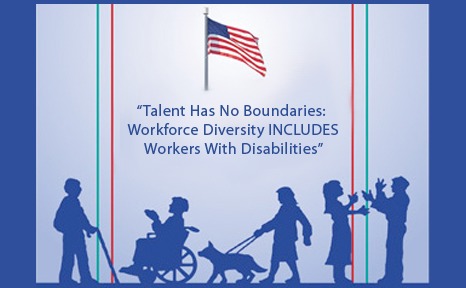Why Disability Employment = Good Business

In case you missed it, this week marked the 26th anniversary for one of the USA's landmark civil rights laws, the Americans with Disabilities Act of 1990 (ADA).
All savvy employers should know by now that providing equal opportunities to people with disabilities simply makes good business sense in the 21st century economy. However, it appears that some CEOs and executive leaders within corporate America still haven’t gotten the message. Ditto that for mid-sized and smaller companies.
The ADA was signed into law by President George H.W. Bush on July 26, 1990. This sweeping law has opened the doors of inclusion and gainful employment to tens of millions of citizens with disabilities nationwide.
However, voluntary compliance with the ADA by employers still can't be taken for granted. This message needs to be reiterated because disability discrimination still runs rampant in many aspects of modern day society, from Wall Street to Main Street and beyond.
President Obama stated the following: "The ADA sought to guarantee that the places we share -- from schools and workplaces to stadiums and parks -- truly belong to everyone. It reflects our Nation's full commitment to the rights and independence of people with disabilities, and it has paved the way for a more inclusive and equal society. For the 6.5 million students and the approximately 50 million adults living with mental or physical disabilities, the ADA has swung open doors and empowered each of them to make of their lives what they will."
Paradoxical Principles
The bad news is that too many large and mid-sized companies are missing out on some of the best available talent by excluding people with disabilities for alleged discriminatory reasons.
On the other hand, the good news is that many savvy and progressive employers have already learned from real-world experience that recruiting, hiring, training, retaining and advancing well qualified individuals with disabilities contributes to greater bottom-line productivity and profits.
Being more inclusive should be of utmost importance to all employers in an increasingly diverse society and competitive global marketplace.
Nevertheless, a continuing stigma of disability bias is evidenced by the large number of discrimination allegations and lawsuits against intransigent employers who reject voluntary compliance with the ADA. This persistent problem is magnified when accounting for the estimated thousands of unreported incidents of disability discrimination in the employment context and all facets of society.
Thus, most companies would be wise to keep in mind that employment disputes over disability issues are costly, time consuming and may jeopardize a corporation’s coveted brand image -- while offending a large and lucrative consumer base and causing bad PR.
It’s hard to believe that one quarter century after the ADA’s enactment, individuals with disabilities still confront a plethora of unfounded myths, fears and stereotypes about their ability to do the job.
These biased attitudes preclude people with disabilities from reaching their full employment potential based on talent, ability and merit alone. This should be the only criteria for making employment decisions related to everything from hiring and firing, to terms and conditions of employment.
Repeat: all employees should be assessed based on their talent, ability and merit to do the job -- period!
Moreover, it’s paradoxical that in the USA, a country founded on the bedrock principles of freedom and equality, well qualified applicants and employees with disabilities are still denied the basic freedom to compete and advance on a level playing field. That is, one without discriminatory barriers and stereotypes that have nothing to do with one's real ability.

Disability Population
It's important to recognize that disabilities affect people of every race, color, gender, religion, age and national origin – a huge portion of the U.S. population and global populace.
Did you know, for example, that according to the U.S. Census Bureau: 20% of all Americans have a temporary or permanent disability. That equates to about 60 million citizens of all ages who represent a consumer base worth hundreds of billions of dollars. This is a colossal chunk of purchasing power in an ultra-competitive global economy.
Moreover, the percentage of Americans with disabilities has held steady over the years and will likely increase as the Baby Boomer and Generation X populations continue to age and live longer thanks to breakthroughs in medicine and technology.That’s why disability discrimination is a flat out bad business practice, not to mention being unlawful. Why would any smart employer intentionally alienate such a large segment of the population and ignore such a large pool of untapped talent?
People with disabilities are our parents, spouses, children, relatives, friends, neighbors and co-workers.
The disability population represents an integral segment of society which helps form the very fabric of America.
Furthermore, there are a significant number of disabled veterans who bravely gave all they had during their military service to America -- including the ultimate sacrifice: their lives. Some of the honorable organizations which represent them include Disabled Veterans of America (DAV), Disabled Veterans National Foundation and Paralyzed Veterans of America.
Two Bush Presidents
It’s also worth noting that the ADA Amendments Act of 2008 (ADAAA) was signed into law by President George W. Bush, following in the footsteps of his father. The ADAAA reversed several Supreme Court decisions which proved detrimental to equal employment opportunity for the disability community at large.

To their collective credit, the two Presidents Bush understood the important principles and timeless moral obligations of America regarding disability equality across the board. That is, despite the partisan political positions of some ardent ADA detractors within their own party.
- Pictured above: President George H.W. Bush signs the ADA into law (07/26/90).
But disability policy should not fall prey to political partisanship and baseless bickering by lawmakers or C-Suite executives. Rather, disability-based policies should be strictly nonpartisan in nature because the large disability population represents a broad cross section of America.
Further, even one case of disability discrimination is one too many.
It’s also worth pointing out to critics of the ADA that it was President Ronald Reagan who espoused the “Big Tent” philosophy of inclusion for the Republican Party. Further, America’s longest serving president, Franklin Delano Roosevelt (FDR), had a physical disability and used a wheel chair – for which some younger generations, like Millennials and Gen Z, might be unaware or not really care.
However, FDR’s disability was often hidden from public view during his presidency to prevent the stigma and discriminatory attitudes that were prevelant. This occurred during an age before the dominating influence of television on public opinion.
Yet FDR’s unique ability and leadership qualities are what led America to persevere through, and ultimately overcome, the Great Depression. His famous “Fireside Chats” and other examples of leadership proved instrumental in galvanizing America during a period of immense historical challenges.

(Photo from FDR Memorial in Washington)
This should serve as a valuable lesson to current lawmakers, presidential aspirants and corporate leaders nationwide, some of whom still castigate disability rights and use it as a wedge issue (either implicitly or by design).
Return on Investment
It remains an unfortunate reality of modern times that too many companies are obstinate in hiring and reasonably accommodating employees with disabilities. But let's also consider the return on investment (ROI), or the business case for disability employment.According to the esteemed Employment and Disability Institute of Cornell University’s School of Industrial and Labor Relations:
- $269 billion: the amount of earnings for employees with disabilities in 2009.
- 87 percent: consumers who responded to a survey who said they “agreed” or “strongly agreed” that they would prefer to give their business to companies that employ people with disabilities.
92 percent: survey respondents who said they were “more favorable” or “much more favorable” toward companies that hire people with disabilities.
- 57 percent: employers who provided cost information related to disability-based accommodations said the accommodations needed by employees cost absolutely nothing.
- 36 percent: employers who said they experienced a one-time cost in accommodating employees with disabilities.
- 4 percent: employers who said the accommodation resulted in an ongoing, annual cost to the company.
$500: the typical one-time expenditure by employers who provided a reasonable accommodation to an employee with a disability.
- 600 percent: employers who provided internships to people with disabilities were nearly six times more likely to hire those individuals.
- 500 percent: companies with a strong senior management commitment to disability issues were five times more likely to hire people with disabilities.
Good Business Sense
Many people with disabilities are qualified, ready, willing and eager to work. In fact, some employees with disabilities are seeking to work more -- not less.
According to a recent study by the non-profit Kessler Foundation:
- "While employees with disabilities are working an average of 35.5 hours per week, 60 percent are seeking more hours."
- "Notably, individuals with disabilities are overcoming barriers to employment, including lack of transportation."
- "Needing more education or training was the number one barrier reported when looking for a job; of the 41 percent who reported it, more than 38 percent overcame the obstacle."
Therefore, it’s incumbent for corporate leadership to send a clear message from the top-down that diversity and inclusion make good business sense, including hiring qualified people with disabilities based on merit.
It’s just not enough for the Human Resources Department or mid-level managers to put the word out. That’s because when the message is unequivocally communicated from the very top of the organization, it has a much higher likelihood of being taken to heart and followed all the way down the organizational chart.
Moreover, new and evolving cost-effective and cutting-edge technologies are available to accommodate many employees with disabilities per their essential job functions. As noted above, the average cost to a business of providing a reasonable accommodation for an employee with a disability is $500.
In essence, disability accommodation is NOT a major business expense per the return on investment in human capital resources.

Additionally, some disability accommodations, like alternate schedules and flexible work, cost nothing at all. Telework (remote work or telecommuting) on a regular or periodic basis, for example, will usually save money for employers and reduce environmental degradation inherent with gas guzzling commutes.
In the end, it really shouldn’t matter from whom or where employee talent derives. Ability is what counts most, and it should never be ruled out categorically by employers simply because a person happens to have a disability.
To the contrary, most qualified employees with disabilities usually work harder, smarter and are more productive and loyal than their co-workers.
That’s because of the high hurdles employees with disabilities must overcome to secure gainful employment. Thus, they tend to value and cherish their jobs more than other workers do.
Final Thoughts
In 21st century America, disability discrimination has no place in the workplace or any other place. Yet 26 years after passage of the landmark ADA, people with disabilities are still too often treated as second class citizens. This must end.
The fact is that qualified job applicants with disabilities can be found mostly everywhere in every industry. Employers merely need to fine tune and readjust their recruitment strategies and practices, or risk missing out on key talent.
Closely coordinating with disability advocacy groups is a good first step to open the clogged pipeline. Again, disability employment is all about ability, skills, talent and merit – rather than unfounded myths, fears and stereotypes.Lastly, the fundamental principle of equal opportunity and equal justice for all represents the very essence of the American Dream. This principle is enshrined in the Declaration of Independence, which states that all individuals have “unalienable rights” to “Life, Liberty and the pursuit of Happiness...”
And that includes people with disabilities.
DBG

You also might like:
- How to Engage or Elude Monster Managers (July 23, 2016)
- Why Workforce Diversity is Simply Good Business (June 28, 2016)
- Memo to CEOs: Fire Monster Managers Now! (June 21, 2016)
- Should Managers be Feared or Loved? (May 23, 2016)
____________________________________________________________________________________
David B. Grinberg is a beBee Brand Ambassador with prior work experience in the White House, U.S. Congress, federal government agencies, national news media and elsewhere. In addition to beBee, you can find David on Twitter, Medium and LinkedIn.
NOTE: All views and opinions are those of the author only and not official statements or endorsements of any public sector employer, private sector employer, organization or political entity. The information above is NOT legal advice.Articles from David B. Grinberg
View blog
In case you haven’t noticed, live streaming is all the rage these days. · But not every social medi ...

Is love in the air at your office around Valentine’s Day? If so, remember this: it simply makes good ...

How concerned are you about falling prey to cyberattacks in the New Year? · Whether you’re a corpor ...
Related professionals
You may be interested in these jobs
-

Information Systems Security Engineer
Found in: ZipRecruiter Test10S US C2 - 3 days ago
Birchmere Group Fort Meade, United StatesJob Description · Job DescriptionSalary: Depends on Experience · ***You MUST already have a TS/SCI Clearance with a Polygraph to qualify*** · Information Systems Security Engineer Level 3 · The Information Systems Security Engineer (ISSE) shall perform, or review, technical secur ...
-

occupational therapist i
Found in: Careerbuilder One Red US C2 - 5 days ago
University Health System San Antonio, TX , USA, United StatesFull Time · 4502 Medical Dr. · Allied Health · Day Shift · This is for ADULT THERAPY. · POSITION SUMMARY/RESPONSIBILITIES · Assists in carrying out occupational therapy treatment programs for inpatients and outpatients under the direction and supervision of licensed occupational ...
-

Travel Nurse
Found in: Talent US A C2 - 4 days ago
MedUS Healthcare Chapel Hill, United StatesMedUS Healthcare is seeking an experienced Intensive Care Unit Registered Nurse for an exciting Travel Nursing job in Chapel Hill, NC. Shift: 3x12 hr days Start Date: 05/28/2024 Duration: 13 weeks Pay: $1898 / Week About MedUS Healthcare: · MedUS Healthcare, formerly Axis Provid ...

Comments
Joyce 🐝 Bowen Brand Ambassador @ beBee
2 years ago #12
Funny… I was just reading as a recognized intellect and found it enlightening to say the least.
Things certainly do change, don't they, David?
David B. Grinberg
6 years ago #11
David B. Grinberg
6 years ago #10
David B. Grinberg
7 years ago #9
I'm grateful for your kind words and positive engagement, Lisa \ud83d\udc1d Gallagher. I've said it before and I'll keep saying it: you are a real gem! Thanks for ALL you do, which is very much appreciated.
David B. Grinberg
7 years ago #8
David B. Grinberg
7 years ago #7
David B. Grinberg
7 years ago #6
David B. Grinberg
7 years ago #5
David B. Grinberg
7 years ago #4
David B. Grinberg
7 years ago #3
David B. Grinberg
7 years ago #2
David B. Grinberg
7 years ago #1